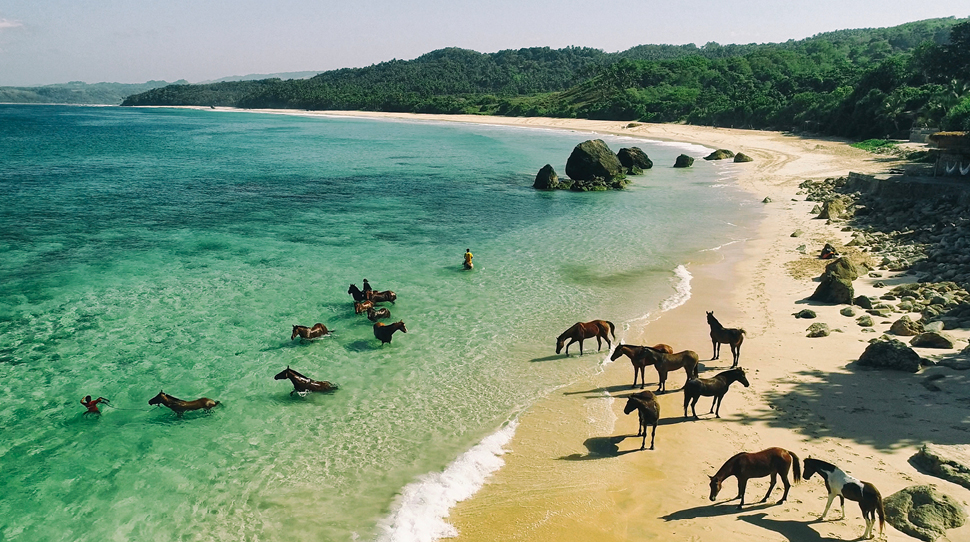

Descending from our plane onto the sun-baked tarmac of Tambolaka Airport — a single-runway outpost in West Sumba, Indonesia — we knew we were far from the congested streets of Bali. The airport’s compact terminal was barely larger than a rural bus station but buzzed with a handful of arrivals. There, NIHI Sumba’s staff greeted us with warm smiles and whisked us into a hunter-green open-air safari Jeep, our first hint we were also far from an ordinary wellness retreat.
As we set off on the 1.5-hour drive south to the resort, the stark contrast with Bali was apparent. Despite being just a 50-minute flight from that tourist favorite, Sumba — an island the size of Massachusetts — is replete with rugged savannahs, rocky limestone hills, waterlogged rice paddies and thick jungle. Largely unspoiled and sparsely populated, Sumba is dotted with tiny villages of traditional huts (uma mbatangu in Sumbanese) with high-peak thatched roofs that resemble shaggy witch hats (the marapu, or spirits of ancestors, are said to reside in the apex, acting as sentinels over the residents).
There are no strip malls, supermarkets or traffic. Here, ancient traditions persist. Families still pay dowries with livestock. Beauty is measured in the black teeth and ruby lips that come from chewing native betel nuts. As part of the spiritual life, animal sacrifices are common rituals during celebrations and ceremonies.
While undiscovered as a mass destination, you’ll find those in the know at NIHI Sumba, a boutique hideaway that harnesses the island’s untamed beauty into bucket-list-worthy experiences. The hotel began in 1988 as a humble surf lodge fronting Occy’s Left, a legendary break. After entrepreneur Chris Burch and hotelier James McBride acquired the property in 2012, they transformed it into NIHI, a luxury resort with majestic horses that freely gallop along the beach and plunge into the cerulean waters of the Indian Ocean.
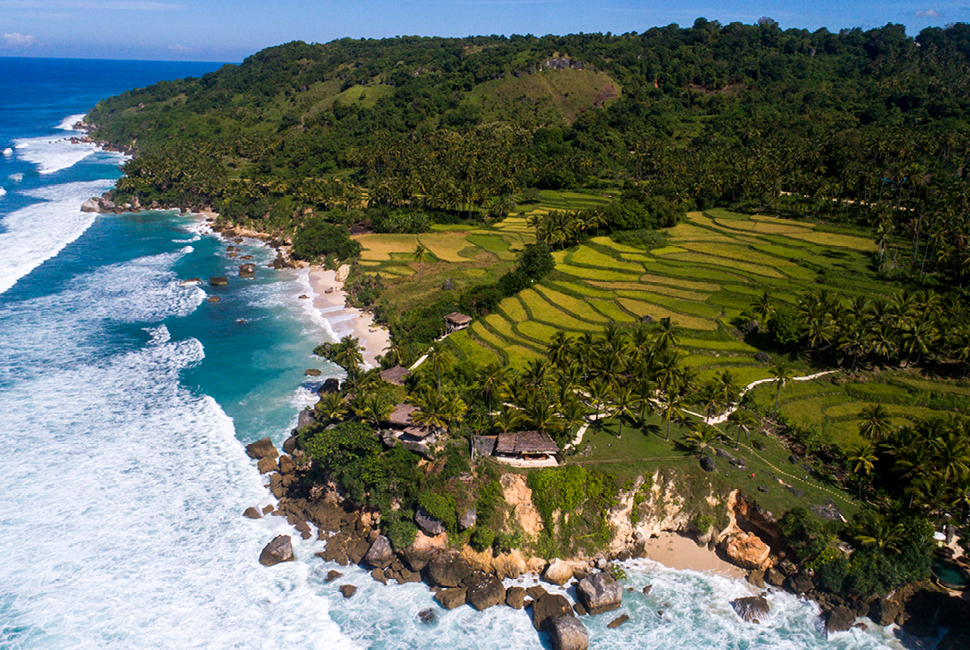
While NIHI remains an adventure-fueled getaway, it also has evolved into a haven for well-being, with the hotel launching Wild Wellness this month. The program devises unforgettable, one-of-a-kind activities that connect you with the surrounding nature.
Wellness is big business in travel. The Global Wellness Institute projects 2024 wellness tourism revenues will surpass a staggering $1 trillion. Within this burgeoning market, NIHI stands apart. Rather than offering a pre-packaged, rigid boot camp experience, Wild Wellness embodies a “choose your own adventure” philosophy as untamed as the hotel’s surroundings.
“We should focus on well-being rather than the idea of what the market tells you is wellness,” says Melany Martinez Thomas, director of Wild Wellness. This perspective challenges the industry’s often prescriptive nature. “Because then it’s, ‘The only way to be taking care of yourself is to do yoga, to do meditation, to eat plant-based, to have green juices, cucumber, celery. No, paleo. No, keto.’ It’s so confusing,” she says.
NIHI’s Wild Wellness program encourages guests to redefine wellness on their own terms. As Martinez Thomas puts it, “If you change the question and say, ‘What do you do for your well-being?’ Maybe you say, ‘I stopped eating out in restaurants,’ ‘I go shopping in the organic market or the farmers market because I feel good that I support a small market,’ ‘I cook for my family’ or ‘I go fishing.’ What is more meditative than fishing?”
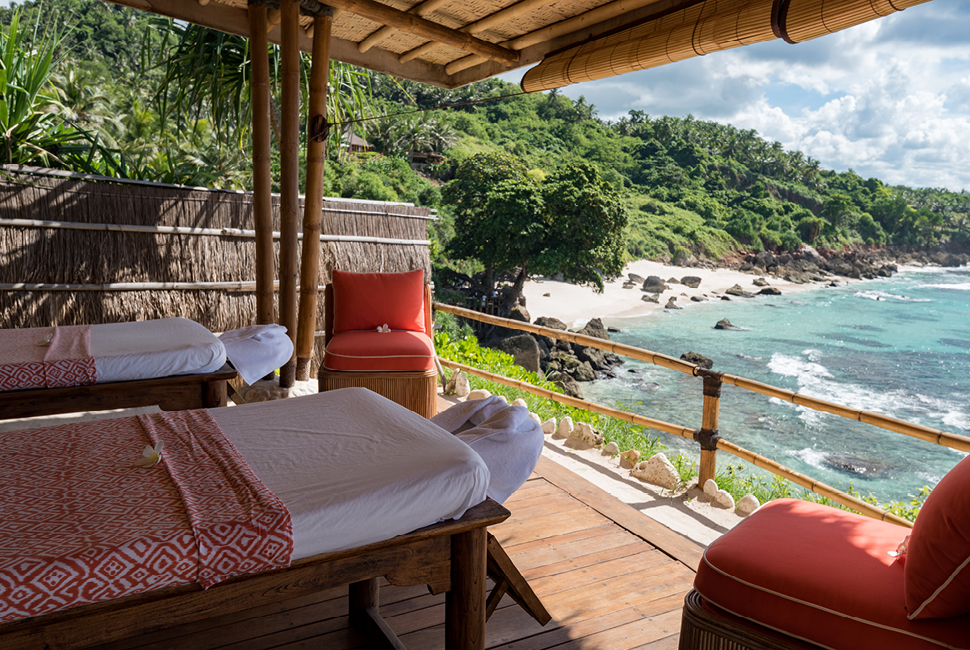
Embark on a Spa Safari
The best of the Wild Wellness offerings is the Spa Safari. This full-day experience (also available as a half-day option or an overnight stay in a secret spa villa) begins with a journey to the spa itself. You can arrive via horseback, mountain bike or safari Jeep.
We opted for the scenic guided sunrise hike through verdant rolling hills and tiered rice fields. Our trek included a stop in Wehola, a 500-year-old village, to meet some locals, learn about their way of life and peruse Sumbanese handmade crafts, like intricately woven purses and vibrant beaded jewelry.
While the steamy air alone will leave you with rivulets of sweat, the hike will be worth every drop once you reach the breathtaking clifftop spa. You will refuel with a spread of eggs, croissants, granola, tropical fruit and more under a thatched roof as the the azure waves roll ashore nearby.
Next, you’ll sit down with ginger lemongrass tea and choose from a chalkboard spa menu that includes the Kadu Karbau Massage, which incorporates stretching and the hotel’s own Sumba 7 oil (made from natural, sustainable island ingredients like ginger, galangal and betel nut); the Warming Boreh, a fragrant clove and cinnamon wrap; the Sumbanese Lulur, a green tea and turmeric exfoliation; and the Hydrating Hair Smoothie, which slathers avocado cream, rosemary, lavender and coconut oil onto your locks. Pick as many as you’d like to fill six utterly indulgent hours (or 2.5 hours for a half-day) of pampering.
Your selected services unfold in a bale — a spacious, secluded open-air stone treatment room complete with a private shower and bathroom. As skilled hands work their magic, you’ll hear the waves crashing and feel the sea breeze caress your skin as the world falls away. Afterward, retreat to your bale’s Bali bed, where you can ease out of your pampering-induced afterglow, surrounded by swaying palm fronds and ocean views. Even those who’ve proven impervious to relaxation will leave feeling calm and renewed.
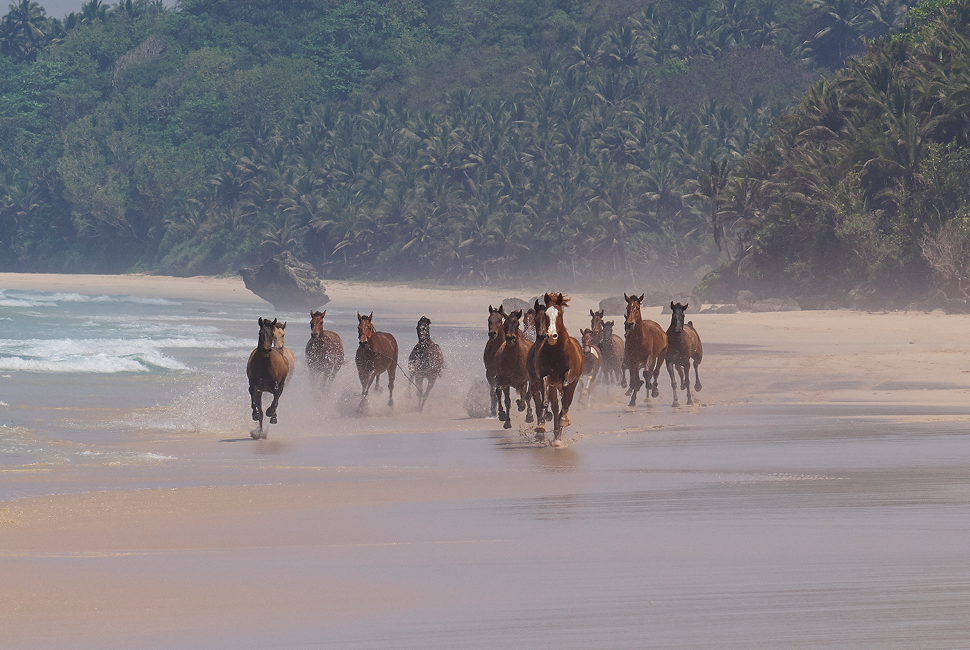
Heal with Horses
Aside from watching the horses’ twice-a-day beach runs and dips, the luxury hotel gives you more ways to connect with its 28-member herd. You can ride the sandalwoods — the breed is native to Sumba — along a 1.5-mile scenic stretch of sand and even join them for an exhilarating swim.
But for a deeper, more therapeutic experience, try one of the equine retreats, which provide five interactive sessions with the animals daily.
Equine therapy helps treat anxiety, depression, grief, addiction, PTSD and more. NIHI has been using it for 10 years, enlisting the horses for activities such as breathwork, meditation with sound healing, and yoga. Each retreat begins with confidence-building exercises between you and your steed. You might lead your new friend through an obstacle course using only your body language, or let them lead you, blindfolded, trusting the horse to guide you — experiences that foster a profound bond with these gorgeous creatures with their shiny coats, calm demeanor and gentle dispositions.
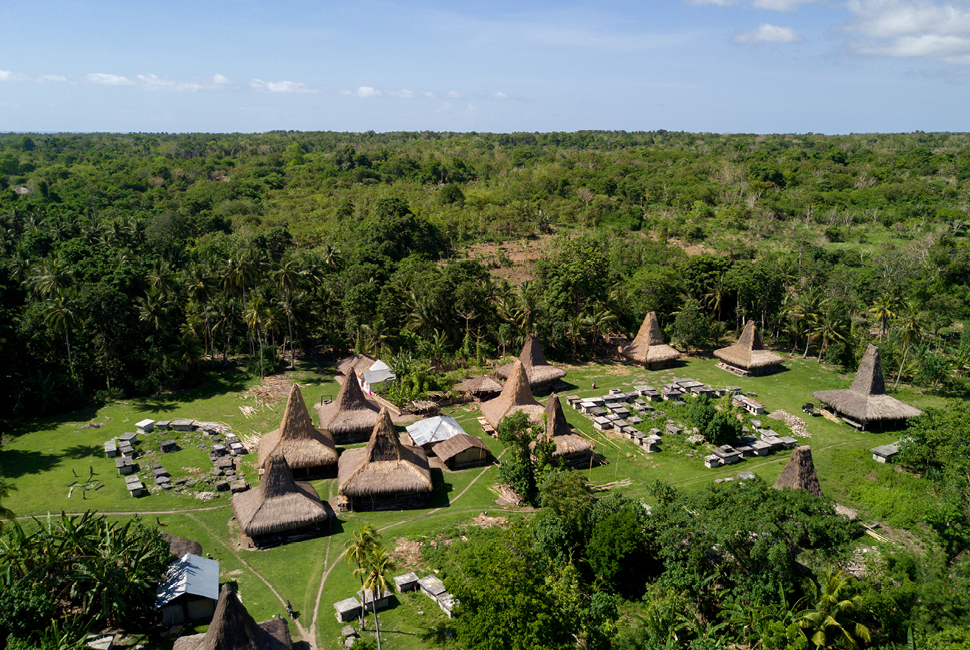
Get Active
If you seek more vigorous pursuits, sign up for the Wildly Fit program. Across five, seven or 10 days, you’ll get in daily workouts with hikes, yoga, Pilates, surfing and classes like rock running (an endurance-boosting exercise of running underwater with weights that is used by Navy SEALs and surfers).
Hiking is a particular highlight — NIHI sits at the head of more than 90 miles of trails that cross diverse terrains. The trek to Rice Island begins at Nihiwatu Beach and winds through streams and rice paddies and passes near villages. The journey culminates at a scenic lookout where you can soothe your tired feet in a plunge pool before savoring a hot lunch at a table where palms frame vistas of sprawling rice terraces with buffalo peeking their heads out of the water. The Red House hike brings you to a nearly deserted Dasang Beach, a wide swath of sand with roaring waves. A bamboo perch provides an elevated vantage point for taking in the dramatic scene and enjoying a meal.
No matter your itinerary, the hotel also offers a host of rotating activities, like carving marapu (small limestone statues named for what they hold: the souls of ancestors who help protect and bring good fortune), chocolate making, Sumbanese ikat weaving and botanical walks to learn about the healing power of local Wallace Line plants.
In addition, NIHI also brings in visiting practitioners like Sanctum, an Amsterdam-founded company that orchestrates silent disco classes worldwide in unusual settings, like ancient Roman ruins or a candlelit church, but amps them up with a high-energy mix of dance, kundalini yoga and martial arts set to techno.
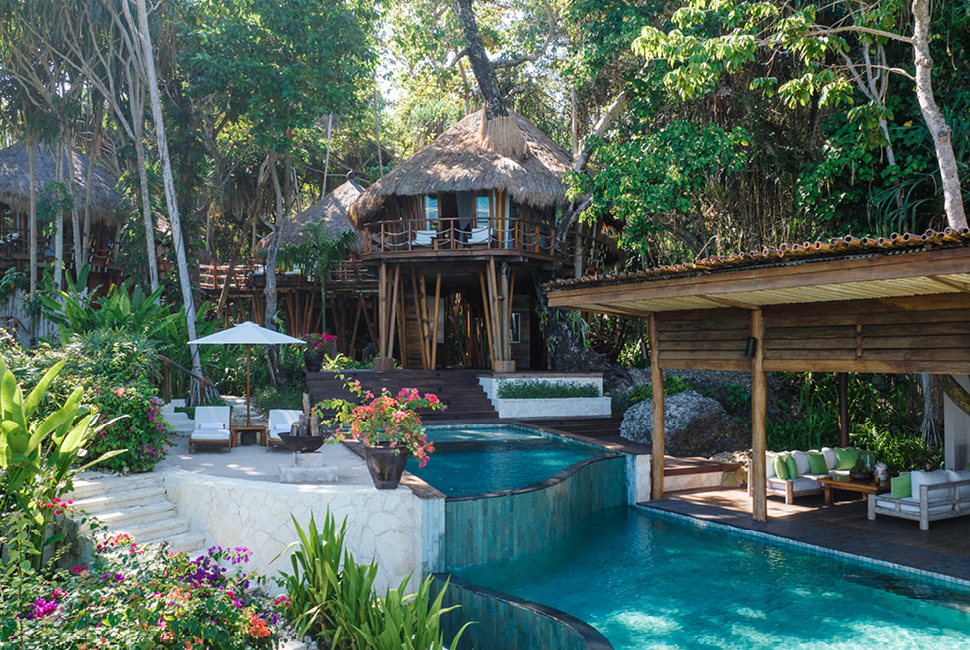
Stay in a Treehouse
It’s fitting that among the Sumba hotel’s 27 villas, the coveted place to stay is the Mamole Treehouse. Three stilted, thatched-roof villas — all have air conditioning — hide among the treetops, connected by walkways and a vast open-air first floor that offers a living room, a dining room, a spa room with two treatment beds and two pools. Decorated with wood furnishings, live-edge tables, rattan wall coverings and net-covered beds, the circular bedroom villas have glass walls and terraces that further immerse you in these pristine natural surroundings.
Perched at the edge of the property’s 567-acre jungle, the secluded Mamole gives you little reason to leave the treehouse, especially with its tiered infinity pool, rousing ocean views and a dedicated butler at the ready. However, the wild allure of Sumba and NIHI’s myriad adventures beckon.
